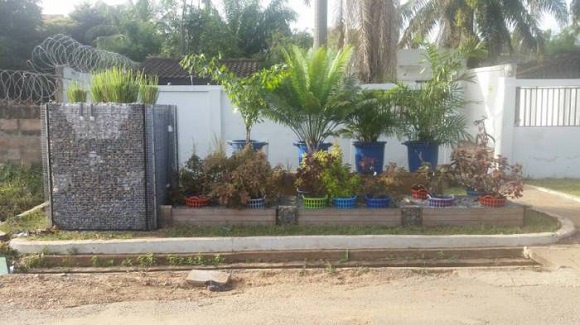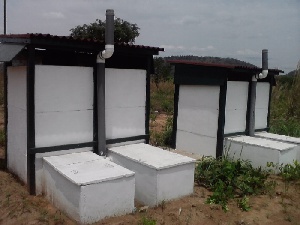Of the courses that I took in my first year university education in the United States – in the early 1970s – one in particular resonated with me. Titled “Living in The Environment”, the seminar was such an eye opener that I kept the textbook which cost US$15.55 in those days. In a topic, “Ecological Waste Management and Recycling,” the author, G. Tyler Miller, Jr., noted: “Instead of overloading aquatic systems [with] rich sewage effluents, these plant nutrients should be returned to the land (forests, parks, and croplands) or to aquaculture ponds as fertilizer.”
Miller noted that waterless toilets not only saved water but also reduced the need for more and more expensive sewage treatment plants. He cited “the Clivus Multrum waterless toilet” widely used in Sweden which uses bacteria to break down human and kitchen wastes which form a dry, odourless, solid material that can be removed every year or two and returned to the soil as fertilizers. [The solid waste is collected through a structure with a latch in the basement floor].
Ephraim Amu the agriculturist
In the context of fertilizers, I recalled the biography of Ephraim Amu, titled “AMU The African” authored by Fred Agyemang. While Amu was known famously as a composer and a musical genius, little did we know that he was a keen agriculturist at the Akropong Presbyterian Training College. The biographer noted that Amu used “unorthodox” means to increase the yield. The author wrote: “being the tutor in charge of agriculture and college gardening, [Amu] would ask the Kru boys who removed the college ‘night soil’ or toilet pails to put the filled pails at a place from where the students could carry them away to manure the college farms.”
Amu’s manuring method “increased the output of food for the college garden. More cassava, beans, pepper, bananas, garden eggs, spinach, cocoyams and yams were grown and harvested by the students year after year. More ‘operation feed yourself’ farming effort was encouraged and this increased the output of foodstuff at the Akropong College in the 1930s.”
Kweku Anno, KNUST alumni
Properly managing our organic waste to dramatically enhance our environment and provide vital by-products for agriculture brings to mind the agricultural scientist, Ing Kweku Anno, educated at Kwame Nkrumah University of Science and Technology (KNUST). He once wrote: “Unfortunately the reality now is that most of the organic waste we generate from our homes, offices, workplaces, farms, factories and markets end up in our drains and open spaces and subsequently washed into rivers, streams, lakes and lagoons.
“This accumulation of organic waste in our water bodies lead to excessive aquatic plants and algae growth. Over time, decaying aquatic plants and algae eventually kill off the waterbody ecologically. Already, many streams, rivers, lakes and lagoons near our urban areas are dead. Many water sources and water bodies within the landmarks between Accra and Tema are dead!”
On the larger national scale, he lamented: “Portions of major rivers running through major cities have become sewers. The environs of the Densu Estuary have become a waste dump with waste directly poured into the lagoon and mangroves! One can now see leachate from old dumps around Weija and Oblogo in the Ga South flowing directly into the Densu River downstream of the Weija Lake.”

Save the environment
Concerned about the rapid destruction of the environment, he said: “Waste is dumped indiscriminately and when the rains come, they are washed into our water bodies. Additionally, faeces from septic tanks and other traditional pit latrines are being indiscriminately disposed into water bodies. There are many dysfunctional sewage treatment systems in Ghana. Some major institutions like hospitals, universities, hotels and high occupancy offices have their waste running directly into the nearest drain and/or water body untreated. The use of septic tanks also contributes to this problem because when emptied their ‘cargo’ is dumped untreated.”
He explained that “Organic waste everywhere is constantly in a process of decomposition into its basic elements of water, carbon dioxide and nutrients which is recycled to plants and animal life via the nutrient and carbon cycles. We live in the tropics where the combination of high temperature and moisture speed up the decomposition of organic matter; and the recycling of nutrients is fastest. Unfortunately, our drainage system mainly of gutters transports both liquid waste and runoff including all the decomposed organic matter into the nearest low land which ends up in our water bodies, thus disrupting the natural nutrient cycle.”
Anno’s practical products
Anno cautioned that since Ghana’s vegetation is lush during the rainy season, “This might lead us to think our land is fertile. The irony here is that any attempt at farming on these same lands yield very little. Our farmers remain extremely poor and the youth are abandoning farming in droves. Many attempts by all our governments since independence at improving farming have all been failures. State Farms established soon after independence were all monumental failures. In the late 1970s and early 1980s, there were policies in place to encourage senior public servants to venture into commercial farming by making subsidised farming equipment and other inputs available to them.”
Anno’s BIOFILCOM’s research and practical efforts has resulted in various methods and products that convert household and industrial wastes into useful products that sustain the environment while adding yield to any agricultural effort including horticulture and fish farming. Note two of his environmentally safe designs in the pictures.
[To be continued]
Email: anishaffar@gmail.com
Website: anishaffar.org
Opinions of Thursday, 18 January 2018
Columnist: anishaffar.org















